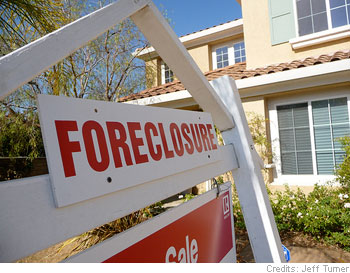 It’s hard not to be both amused and angry after reading this story by David Streitfeld in yesterday’s New York Times about homeowners who are intentionally not paying their mortgages but are not facing foreclosure because…well…their mortgage servicer isn’t foreclosing on them.
It’s hard not to be both amused and angry after reading this story by David Streitfeld in yesterday’s New York Times about homeowners who are intentionally not paying their mortgages but are not facing foreclosure because…well…their mortgage servicer isn’t foreclosing on them.
You can’t call this a “movement” because it doesn’t appear to be organized. As the Times story notes, this is happening with increasing frequency because individual homeowners are realizing that the foreclosure process isn’t automatic and are taking advantage of the situation by deciding not to pay.
Stories like this almost certainly will encourage others to stop making payments, and, as the story also notes, a new business/industry/profession seems to be developing in mortgage payment avoidance counseling. So, the number of homeowners who simply stop making payments and dare their servicer to do something about it may well continue to grow.
The question is why are servicers letting this happen. If, as the article indicates, servicers don’t have the resources to deal with the situation, why haven’t they hired more people? It’s obviously not because, as servicers tried to say when the mortgage crisis began, workers aren’t available. And given the increasing profits of many banks, it’s not because of a lack of cash.
My contacts in the mortgage lending industry tell me that the basic reason is the prevailing thought that homeowners will start paying again on their own as the economy continues to recover in the months ahead. In other words, the industry is largely assuming that the problem will be self-correcting.
Hidden in this assumption, of course, is a calculation that the cost of foreclosing in this environment will be greater than what will be recovered and that, given the current value of the property that would be recovered, it’s not worth the time, effort, and expense to go after all of the homeowners who are voluntarily defaulting .
But there’s more going on here. For a variety of reasons, lenders are most likely to foreclose on property they own but less likely to take action on behalf of the investors whose mortgages they’re servicing, and most loans are owned by investors. Foreclosing on a loan likely means that an investor will have to write down the value and that will have a variety of negative consequences for their own finances. In addition, investors often have trouble establishing that they actually own a particular loan and have the right to foreclose. Not only have courts become increasingly unwilling to take their word for it, attorneys are increasingly aware that paperwork is missing or incomplete.
There also seems to be a growing unwillingness among some lenders to foreclose because of the likelihood that a very large number of homeowners will end up being shut out of the market for close to a decade if, as would almost certainly happen upon foreclosure, their credit ratings were negatively affected. The investors, realtors, homebuilders, etc. need more rather than less buyers so that, as conditions change, the demand and price for homes will be higher than they would otherwise be.
The mortgage lending industry also has to have made some type of political calculation. Massive foreclosures as the financial reform legislation is still being considered in Washington would trigger even more anger and would likely make it easier for Congress to be more punitive. The cost of those changes would likely be far greater than anything recovered with an aggressive foreclosure effort.
You have to wonder whether all of this will be different starting the day after Election Day. By that time action on a financial reform bill will probably be over, the elections will have been held and, if the forecasts are correct, GDP will have grown for four consecutive quarters. With most of the factors that up to now have created an incentive for investors not to foreclose changed, foreclosures may again get back in vogue.
- Bulenox: Get 45% to 91% OFF ... Use Discount Code: UNO
- Risk Our Money Not Yours | Get 50% to 90% OFF ... Use Discount Code: MMBVBKSM
Disclaimer: This page contains affiliate links. If you choose to make a purchase after clicking a link, we may receive a commission at no additional cost to you. Thank you for your support!


Leave a Reply